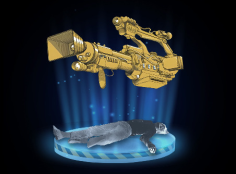
Jeffrey Weinzweig’s Contraptions delves into the futuristic idea of capturing past moments through technology—specifically through the Thermalyzer, a device capable of reconstructing past scenes by analyzing residual thermal energy. This innovative concept is akin to “cloning” past moments, offering a fresh take on time manipulation, and raises philosophical and ethical questions about the consequences of revisiting history.
The Thermalyzer as a Time Manipulation Tool
Time travel is a frequent trope in science fiction, but Contraptions offers a twist on this narrative by focusing on time observation rather than time travel. The Thermalyzer doesn’t allow users to interact with the past, but it does provide a glimpse into it, almost like cloning a moment in time. This concept alone challenges the boundaries between science and fiction—imagine being able to observe a historical event or a personal memory as if it were happening again.
In the novel, the Thermalyzer is used to revisit moments relevant to a murder and its investigation. In doing so, the book explores what happens when technology bridges the gap between past and present, not through travel, but through recollection. This unique “cloning” of the past brings ethical complexities into focus—how much of the past should we be allowed to reconstruct, and to what extent should we rely on these reconstructions?
Cloning the Past vs. Cloning Life: Parallels and Ethical Complexities
The Thermalyzer’s ability to capture past images parallels the ethical dilemmas surrounding cloning biological life. Both involve the recreation of something from the past—a sheep from DNA, or a moment from thermal residue—and both come with concerns over tampering with the natural order. Cloning life forms raises questions about identity, autonomy, and the manipulation of nature. Similarly, cloning the past with the Thermalyzer forces us to consider how we might alter the way we perceive, remember, and relate to time.
What happens when the line between past and present is blurred? Does revisiting the past give us an advantage in the present, or does it imprison us in what has already transpired? In Contraptions, the consequences of such technology are layered and far-reaching. The Thermalyzer, like cloning, is powerful but also fraught with ethical concerns—are we playing god by manipulating time, and what unintended consequences might arise?
The Weight of Responsibility
In Contraptions, the Thermalyzer places a significant weight on those who wield it. Revisiting the past isn’t just a scientific breakthrough—it comes with responsibility. The same can be said about cloning, where recreating life demands careful consideration of ethical boundaries. Both scenarios involve the delicate balance between progress and control, and the novel asks readers to think about whether humanity is prepared for such power.
Ultimately, Contraptions demonstrates that while technology can offer great leaps forward, it also presents moral quandaries. The ability to clone the past, like cloning life, forces us to confront questions of responsibility, control, and the very nature of reality. If we can look back into any moment, do we lose the ability to move forward?
In a world where time and memory are increasingly malleable, Contraptions leaves us with a stark reminder: with great power comes great responsibility. The Thermalyzer, much like cloning, is a tool of extraordinary potential—but it is humanity’s ethical compass that will determine whether we use it for progress or destruction.
